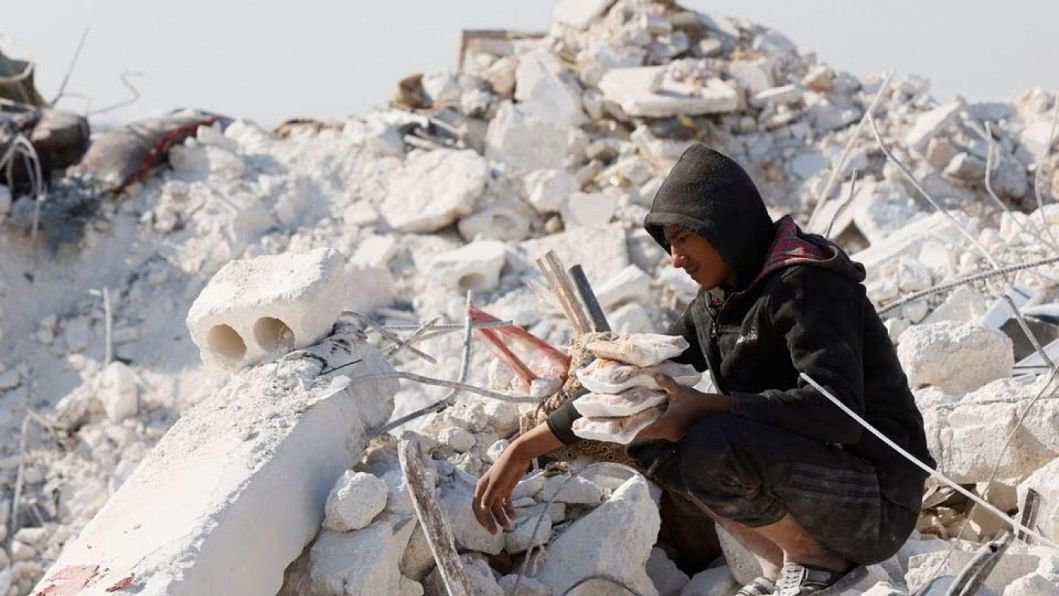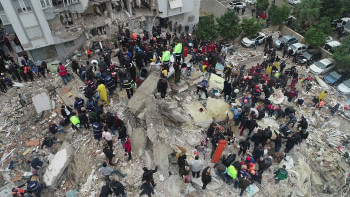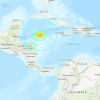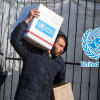Caught in the politics of aid, Syria is suffering

The three devastating earthquakes last week that rocked Turkey and Syria have claimed the lives of more than 41,000 people (as of 3:30 pm Bangladesh time, February 15) and caused the displacement of millions in the region. While the international community did come forward with aid and rescue efforts to support the affected people, Syria – war-ravaged and in the grips of abject poverty and inexplicable human sufferings – was given a second-class treatment.
From sanctions imposed by the West, including the US, to the international community's slow response in pledging aid and support and mobilising resources – except for a few countries including Bangladesh – to the earthquake-ravaged Bab al-Hawa land crossing connecting northwest Syria with Turkey (the only access point internationally acknowledged), aid reaching Syria has been inadequate, to say the least.
In the aftermath of the earthquakes, volunteer group the White Helmets, also known as the Syria Civil Defence, which operates in the rebel-held northern areas, took on the rescue operations and saved thousands from under the rubbles of levelled infrastructure with their bare hands, thanks to an acute shortage of rescue tools. Videos and pictures flooded the internet as White Helmets struggled to rescue as many people as they could. Meanwhile, in the critical first 72 hours, when chances of saving lives and rescuing people are the highest, the world watched the human tragedy intensify in Syria, like silent spectators.
Death toll in Syria currently stands over 5,800 (as of 3:30 pm Bangladesh time, February 15). With every passing hour, chances of finding survivors are becoming slimmer.
While initially adamant, in the face of continued criticism from various quarters, including the United Nations – Secretary-General Antonio Guterres said, "This is a moment in which everybody must make very clear that no sanctions of any kind should interfere with relief to the population of Syria in the present moment." – international organisations, relief and rescue organisations, and human rights bodies, the US has finally relented and exempted earthquake aid into Syria from sanctions for 180 days. But not before the damage has been done and the critical 72-hour window has closed.
Even the UN acknowledged their failure to reach the much needed aid and relief supplies to Syria, in the face of the denunciation from the rescue workers working night and day. "We have so far failed the people in northwest Syria. They rightly feel abandoned. Looking for international help that hasn't arrived," tweeted Martin Griffiths, UN's aid and relief chief.
It was shocking to see that no aid convoys reached the affected areas in Syria for the first three days after the earthquakes. Damage sustained by the Bab al-Hawa crossing have been cited as the reason. However, this could have been avoided had the West, for once, risen above the politics of aid and worked hands-on with the Assad regime and the opposing forces to provide for the victims, equitably.
Syria is already struggling from the shocks of a 12-year civil war; the Syrian people have been subjected to the vicious trauma of war, death, poverty and displacement— 6.9 million people are internally displaced and about 13,000 children have endured death or sustained injuries since 2011. A UN report released last year revealed that more than 306,000 civilians have been killed in the civil war that began in March 2011. Around 13 million people – about half the country's population – have been forcibly displaced during this time.
Some of the people have been displaced up to 20 times since the civil war unfolded. They have very limited access to food (more than 12 million people are food-insecure in Syria, which has seen an increase of 51 percent since 2019), safe accommodation, medical care or basic utility supplies.
These should have been enough reasons for the international community to rise above politics and come to the aid of the Syrian people in the aftermath of the earthquakes. Unfortunately, that was not the case. Even before the earthquake, only 50 percent of the required USD 4 billion aid could be secured. And even as lives in Syria got buried – perhaps forever – under the wreckage of the earthquake, the White Helmets could do little to save lives, despite their best efforts, due to a lack of resources.
"We could have saved many more people if we had the technology and heavy machinery needed to lift debris… All of the aid and necessary provisions given to the overcrowded relief centres are donated by volunteers, civil organisations and charities on the ground," shared a 26-year-old White Helmets volunteer, Fatima Obeid.
Perhaps kindness and compassion are afforded only to a selected few, and the helpless Syrians are certainly not among them. Had this been the scenario in some Western country – victims with whom people in power can relate to – perhaps it would have elicited empathy and prompted forthcoming support.
The West once again failed the people of Syria, and it did not even come as a surprise. But where the West failed, the others – governments, organisations, and individuals from various corners of the world – rose to the occasion. But Syria needs more. The shortages of aid and relief supplies are acute. The least the countries that have taken advantage of the civil war – directly and indirectly, by participating or by selling arms to and partnering with the attackers – can do is repay the people of Syria for everything they have taken from them.
Tasneem Tayeb is a columnist for The Daily Star. Her Twitter handle is @tasneem_tayeb

 For all latest news, follow The Daily Star's Google News channel.
For all latest news, follow The Daily Star's Google News channel. 











Comments